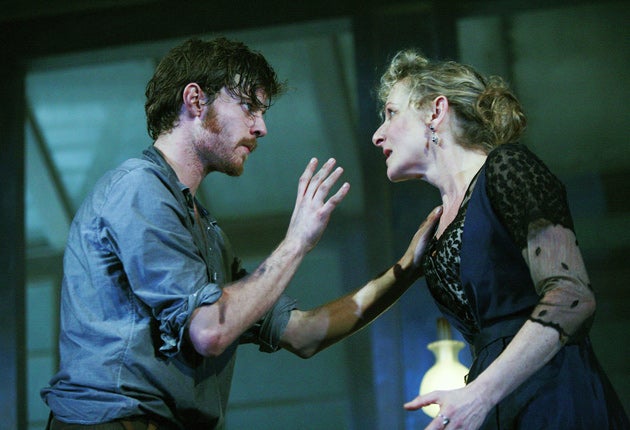Ghosts, Duchess Theatre, London

Further proof that English theatre is going through a wonderfully positive patch is furnished now with this terrifically compelling and often disarmingly comic account of Ibsen's Ghosts. Not only is actor Iain Glen making a most distinguished debut as a director, but he is turning in a witheringly satiric performance as Pastor Manders, the sanctimonious clerical hypocrite whose real God is not the Lord but his own fearfully guarded personal reputation in a community of small-minded backbiters.
My only niggle (and it was gradually eroded as the production proceeded) is Glen's accent that at first seems to waver between a poor man's Ian Paisley and Gardeners' Question Time. Apart from that, his performance and that of Malcolm Storry, as Engstrand, the dodgy carpenter, are masterly demonstrations of how Dickensian in his treatment of religiose humbug Ibsen can sometimes be. This wretched pair have profile-to-profile false piety contests here that are exquisitely well judged.
As the sheets of deception are inexorably dragged off her carefully arranged false version of the past, the bird-like but battle-ready Lesley Sharp breaks your heart as Mrs Alving. She's the mother whose plans to protect her son from the sins of the father (sins that her own repressiveness had caused) have backfired disastrously. A luminous Mrs Alving sounds as counter-intuitive as a "retiring Cleopatra" but here the glinting steel of the woman's progressive thought is as potent, in the earlier episodes, as the excruciating tyre-burn skid marks that she later makes as she backpedals her way into a revelation of truth. There's a matchless moment when she has to fight tears before firmly admitting that poor Oswald was all of...seven...when he was sent away out of harm's reach. Frank McGuinness's new version derives a lot of energy from pointed, but never over-done alliteration as when, abandoning the blackmail of soothing mendacity, Sharp's Alving tries to undeceive Oswald with the patient insistence of a penitent hypnotist trying to awaken a victim from her spell: "Before you were born, your father was a broken man..."
In the latter role, Harry Treadaway, gives a neurologically naked portrayal that is as audacious as it auspicious. He looks like a more aesthetic and sexually attractive D H Lawrence. Dying of syphilis, this Oswald seems to be dazed with an unbearably moving post-dated nostalgia for a future that he more-than-half knows he will never experience. True to the symptoms of his disease, he increasingly loses control of his body so that his actions tell against him. He strews petals from a flower, to demonstrate how much his art loves life, but it looks as though he's shredding it to death. But then the production has its own additionally poetic way with symbolism. The ghosts that Mrs Alving sees crawling like maggots from between the lines of the newspapers can be heard in the sound of rattling of glass, as though a table had been disturbed by spooks, which is heard between scenes and escalates to alarm- bell pitch. Shockingly good.
To 15 May (0844 579 1940)
Join our commenting forum
Join thought-provoking conversations, follow other Independent readers and see their replies
Comments
Bookmark popover
Removed from bookmarks